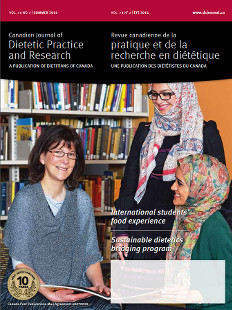Abstract
Purpose: University nutrition students’ experiences of participation in an arts module as part of a senior nutrition course were explored to gain an understanding of the relationship of art to dietetics practice.
Methods: The module comprised discussions, readings, and presentations from dietitian artists, along with three assignments: the production of art, an artist statement, and a reflection paper. The art production depicting an aspect of body image was presented to the class and optionally at a body image conference. An exploratory, qualitative methodology informed by Schön’s reflective practice framework was employed. Three surveys administered at various times during the arts module were used to collect students’ reflections and were thematically analyzed.
Results: Three themes emerged: hesitance to acceptance, emotion and connection, and relationship with dietetics. The education process facilitated a transformation among students, noted as changes in knowledge, perceptions, and attitudes over the course of the module.
Conclusions: The arts provide an alternative platform for an exploration of self and others, for improving practice, and for an examination of novel ways for doing so. Reflection as an education component enables students to contemplate relationships, knowledge, emotions, and practice as interrelated and evolving entities.
Résumé
Objectif: L’expérience d’étudiants universitaires en nutrition ayant pris part à un programme d’arts dans le cadre d’un cours de nutrition avancé a été explorée afin de mieux comprendre la relation entre l’art et la diététique.
Méthodes: Le programme comprenait des discussions, des lectures et des présentations de diététistes artistes ainsi que trois devoirs: une production artistique, un texte sur la démarche artistique et un document de réflexion. La production artistique, qui représentait un aspect de l’image corporelle, devait être présentée au groupe et, optionnellement, à l’occasion d’un congrès sur l’image corporelle. Une méthodologie qualitative exploratoire basée sur le cadre de pratique réflexive de Schön a été utilisée. Trois sondages effectués à divers moments pendant le programme d’arts ont été employés dans le but de connaître les réflexions des étudiants et ont fait l’objet d’une analyse thématique.
Résultats: Trois thèmes ont émergé: l’hésitation quant à l’acceptation, les émotions et l’engagement, et la relation avec la diététique. Le processus d’enseignement a favorisé une transformation chez les étudiants. En effet, des changements sur le plan des connaissances, perceptions et attitudes ont été notés tout au long du programme.
Conclusions: Les arts proposent une plateforme différente pour s’explorer soi-même et explorer les autres, pour améliorer la pratique et pour examiner de nouvelles façons d’y parvenir. La réflexion en tant que composante de l’enseignement permet aux étudiants d’envisager les relations, les connaissances, les émotions et la pratique comme étant des éléments interreliés en constante évolution.



